UNICEF and WHO support national immunization campaign in Syria amid COVID-19 pandemic
More than 210 000 children under the age of 5 across Syria catch up on their vaccines
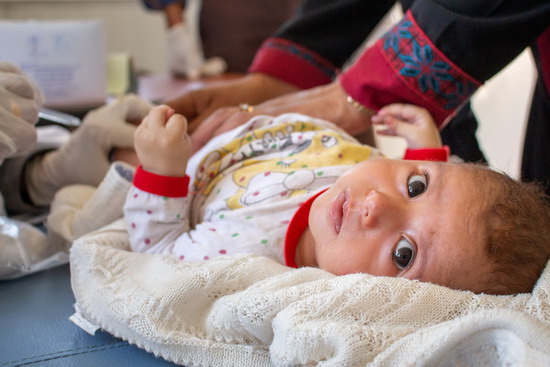 Damascus, 29 June 2020 – With an aim to maintain vital routine immunization services amid the COVID-19 pandemic, a national immunization campaign supported by WHO and UNICEF has concluded across Syria. During the 5-day campaign, implemented by the Syrian Ministry of Health, health workers checked the vaccination status of more than 900 000 children and vaccinated more than 210 100 children to ensure they are caught up with the routine immunization schedule.
Damascus, 29 June 2020 – With an aim to maintain vital routine immunization services amid the COVID-19 pandemic, a national immunization campaign supported by WHO and UNICEF has concluded across Syria. During the 5-day campaign, implemented by the Syrian Ministry of Health, health workers checked the vaccination status of more than 900 000 children and vaccinated more than 210 100 children to ensure they are caught up with the routine immunization schedule.
Over 1000 health centres, 545 mobile teams, 666 temporary vaccination posts and more than 8000 health workers were mobilized for the campaign. In-line with WHO global guidelines, health workers were trained on preventative and precautionary measures, including disinfection, hygiene protocols and overcrowding prevention. In addition, they were provided with personal protection equipment for their safety and that of children and caregivers during the immunization campaign.
“No child should miss out on their vaccinations, now more than ever” says Fran Equiza, UNICEF Representative in Syria, “These are difficult times, parents may feel overwhelmed with worries. Our message to them is clear: make sure your kids receive their routine immunizations to avoid vaccine-preventable diseases. When vaccination coverage goes down, more outbreaks will occur, including of life-threatening diseases like measles and polio.”
According to WHO, there has been about a 5% reduction in vaccination coverage in the first half of 2020. This has occurred mainly as a result of challenges inflicted by the COVID-19 pandemic, including limited access to health centres due to movement restrictions, as well as fear of contracting the virus. WHO continuously asserts its commitment to provide support to save the lives of children and protect them against poor health outcomes, including the threat of vaccine-preventable diseases.
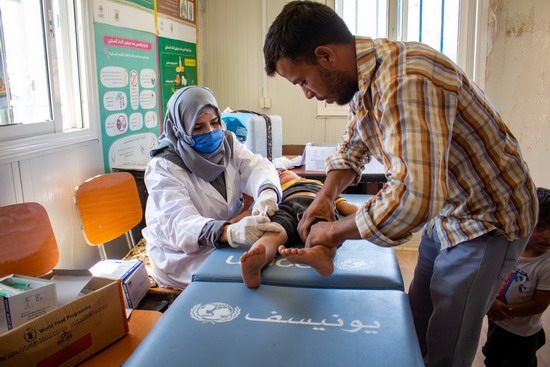 “I would like to thank health professionals for supporting such a significant programme at such critical time. I would like to recognize the enormous competency health vaccinators have exhibited during this mission; and their commitment to protect children in Syria against vaccine preventable diseases and provide them with immunization to enjoy a disease-free childhood. These days, more than ever, the health of all depends on the courage and dedication of frontline heroes. Our deepest gratitude goes to the public health workforce,” said Dr Akjemal Magtymova, WHO Representative in Syria.
“I would like to thank health professionals for supporting such a significant programme at such critical time. I would like to recognize the enormous competency health vaccinators have exhibited during this mission; and their commitment to protect children in Syria against vaccine preventable diseases and provide them with immunization to enjoy a disease-free childhood. These days, more than ever, the health of all depends on the courage and dedication of frontline heroes. Our deepest gratitude goes to the public health workforce,” said Dr Akjemal Magtymova, WHO Representative in Syria.
WHO and UNICEF noted in a joint health brief published this month that health care disruptions due to COVID-19 could have a devastating impact on child mortality in the Middle East and North Africa. The full and safe resumption of immunization campaigns as well as nutrition services, while following strict precautionary measures for infection prevention, are key to helping tens of thousands of children reach their fifth year of age in good health.
Photos of the campaign can be found here and here
For more information:
Salam Al-Janabi
UNICEF Syria
Damascus
+963-950044371
Inas Hamam
WHO Regional Office
Cairo
+20 01000 157 385
About UNICEF
UNICEF works in some of the world’s toughest places, to reach the world’s most disadvantaged children. Across more than 190 countries and territories, we work for every child, everywhere, to build a better world for everyone.
For more information about UNICEF and our work for children, visit www.unicef.org/mena
About WHO
Under its vision of Universal Health Coverage and the right to health care for all people, everywhere, WHO works worldwide to promote health, keep the world safe, and serve the vulnerable. Its goal is to ensure that a billion more people have universal health coverage, to protect a billion more people from health emergencies, and provide a further billion people with better health and well-being.
WHO delivers health supplies by road to northeast Syria
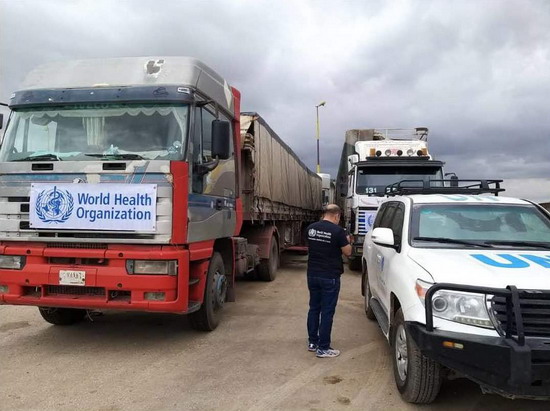 For the first time in 2 years, WHO has been able to deliver medical supplies by road to northeast Syria
For the first time in 2 years, WHO has been able to deliver medical supplies by road to northeast Syria
1 June 2020 — The World Health Organization (WHO) has delivered 20 tons of medical supplies to Al-Qamishli in northeast Syria, the second delivery of its kind in 2 weeks. The supplies will be distributed to public health facilities in Al-Hasakeh, Ar-Raqqa and Deir-Ez-Zor governorates.
The 2 shipments contain equipment and medical supplies to treat many diseases, including COVID-19. The delivery also included basic and mobile X-ray machines, intensive care beds and hospital beds, operating tables, incubators, oxygen concentrator, cholera kits, wheelchairs and a diesel generator.
“During the last 2 weeks, WHO delivered over 55 tons of medical supplies by road. These were the first road deliveries to Al-Hasakeh governorate in northeast Syria in the past 2 years,” said Dr Akjemal Magtymova, WHO Representative in Syria.
“These are challenging times when the focus of the global public health community is on responding to the COVID-19 pandemic,” she continued. “While joining global and national efforts to fight the pandemic, WHO also continues to support basic health services and serve at-risk communities in the northeast, as well as across Syria.”
Due to the Syrian conflict, road shipments have been halted since May 2018. Airlifting relief shipments was the alternative, sometimes costing as much as 20 times the road shipments.
“The road shipments delivered this month represent progress which should be applauded,” says Dr Magtymova. “WHO remains committed to delivering the most essential medical supplies to vulnerable and in-need communities.”
The medical supplies were procured using generous contributions from the Government of Norway and Office of U.S. Foreign Disaster Assistance (OFDA).
WHO welcomes Dr Akjemal Magtymova as WHO Representative in Syria
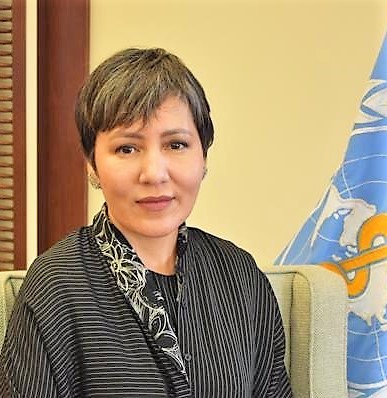 Dr Akjemal Magtymova, WHO Representative to the Syrian Arab Republic
Dr Akjemal Magtymova, WHO Representative to the Syrian Arab Republic
7 May 2020 – WHO welcomes Dr Akjemal Magtymova as incoming WHO Representative to the Syrian Arab Republic. Dr Magtymova joins WHO Syria at a critical time, with multiple public health threats threatening the well-being of millions of Syrians. An outbreak of COVID-19 in the country has placed additional pressure on a health system ravaged by years of war.
“I am delighted to join the WHO Syria team to support its mission. What we do is noble, and I have no doubt that it is driven by this team’s passion to help others. Each of us has a greater reach beyond the individual people we serve, impacting whole populations. WHO is a global leader in public health, and what makes WHO is us, its staff who remain committed to overcoming all challenges and succeeding. We at WHO embrace partnerships; we do not compete for the prestige or the niche, but we gain respect by competency, professionalism and the results we accomplish,” said Dr Magtymova as she started her new assignment.
Nine years of conflict in Syria have resulted in a severely damaged health system and significant shortages in health workers. Vulnerable families continue to rely on essential life-saving aid. Almost 6.1 million Syrians continue to be internally displaced and often lack adequate essential services, including water and sanitation. An estimated 11 million people require humanitarian assistance in 2020, with up to 5 million people in acute need.
Recently, Syria also reported its first cases of COVID-19, with 44 cases now confirmed in the country. WHO classifies Syria one of the high-risk countries globally and a priority country in the Eastern Mediterranean Region.
“We are in the middle of the battle of our lives, and I consider WHO and its partners on the frontlines, alongside surgeons and those working in hospitals. This battle requires our full energy. The world is going to change, and we are writing history. Each and every one of us, individually and collectively, are responsible for its script – and we have a key opportunity now to change the course of many lives in Syria, and achieve something we can be proud of,” said Dr Magtymova.
Born and raised in Turkmenistan, Dr Magtymova has dedicated the past 20 years of her career to international humanitarian aid and development. Prior to her new assignment in Syria, Dr Magtymova was WHO Representative in Oman, where she achieved significant goals within WHO’s “Health for All” vision. Dr Magtymova also served as Deputy Head and Emergency Coordinator of WHO’s Office in Yemen and held several posts in WHO’s South-East Asia Region, where she covered both development and humanitarian programmes.
Dr Magtymova is an MD and holds two Master’s Degrees; an MSc from London School of Hygiene and Tropical Medicine, and an MA from Fletcher School of Law and Diplomacy.
Saving lives in Syria with support from Norway
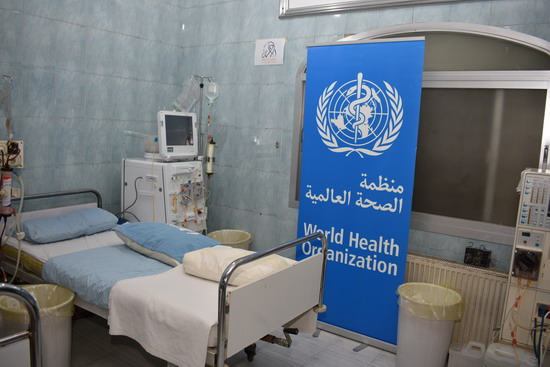 19 April 2020 - Generous funding from the Government of Norway during the last 4 years has enabled WHO to reach more than 1.4 million beneficiaries in Syria and improve their access to primary health care services through 40 nongovernmental organization partners.
19 April 2020 - Generous funding from the Government of Norway during the last 4 years has enabled WHO to reach more than 1.4 million beneficiaries in Syria and improve their access to primary health care services through 40 nongovernmental organization partners.
From 2016 to 2019, Norway provided flexible funding to WHO Syria totalling more than US$ 34 million. Of this, nearly US$ 2.7 million was directed to national NGOs operating within the health sector, allowing WHO to scale up its interventions across the country and access hard-to-reach areas.
“Norway has been among WHO’s key partners throughout the crisis in Syria. Its generous contributions enabled WHO to continue providing health facilities with needed medicines, medical supplies and equipment, as well as mobile clinics and ambulances, facilitating the provision of health care services to patients across the country,” said Dr Nima Abid, acting WHO Representative in Syria.9-year-old Ahmad from Al Hasakeh governorate suffers from polycystic kidney disease and needs 3 haemodialysis sessions every week to survive. “Last year we were displaced more than 3 times and had to travel very long distances to reach Al-Ihsan haemodialysis centre in Aleppo,” his mother said. “And if it were not for this centre treating my son, I would have lost him years ago. I have already lost my husband and will do everything in my power to keep my son safe, despite all the hardships he has been through.”
Al-Ihsan haemodialysis centre is one of many WHO-supported facilities that is able to remain functional thanks to the Government of Norway.
“We appreciate WHO’s immense support for the provision of haemodialysis sessions, among other lifesaving treatments,” said Dr Mohamad at Al-Ihsan haemodialysis centre in Aleppo. “With the regular supply of sessions, the centre is able to provide care and manage many cases,” he added. “WHO’s support to our centre has contributed greatly to fulfilling our mission as doctors and helped us save more lives. Despite all the challenges each one of us is facing, saving the lives of people like Ahmad is what matters at the end of the day.”


